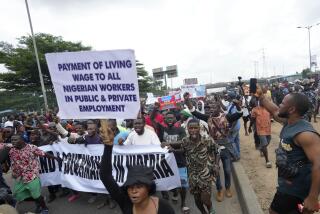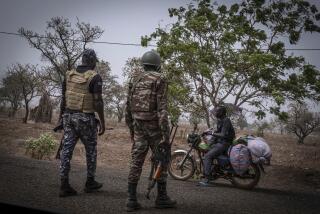Nigerian army attacks rebels in north
- Share via
MAIDUGURI, NIGERIA — The Nigerian army launched an assault Tuesday against “Taliban” militants fighting to establish radical Islamic rule in the north of the country, in an escalation of clashes that reportedly have left hundreds dead.
The rebels, armed with machetes, guns and bows and arrows, had attacked police stations and targeted police and government officials in the predominantly Muslim north Sunday and Monday.
In response, President Umaru Yar’Adua sent in the army to the city of Maiduguri to shell the home of Mohammed Yusuf, the soft-spoken preacher who leads the Boko Haram sect, known here as the Taliban. The army also attacked a mosque in the city.
Black smoke hung above Maiduguri, which throbbed with machine-gun and mortar fire, as the soldiers moved in. Gunfire continued overnight.
Shops and other businesses were closed. Children at a school near the militants’ headquarters fled in terror. Many residents took shelter in the Maiduguri police headquarters, which had been attacked Monday in one of a series of apparently coordinated assaults in four northern states.
“It is too frightening to stay in my house,” said Hamisu Balarabe, 38, a government employee huddled with others at the station. “It felt like the mortars would land in my house. I have never heard such a terrifying sound.”
The bodies of at least 30 militants lay on the ground outside the police headquarters Tuesday. But a police official, speaking anonymously to The Times because he was not authorized to comment, said 197 corpses had been lined up on the ground Monday and since removed. Most of the dead were militants, he said.
Yusuf’s fate was not known. Authorities gave no official casualty figures, but reports from journalists, witnesses and police officers speaking unofficially indicated that hundreds have died.
“Fighting is still going on; therefore, we cannot give any casualty figures,” Maiduguri police spokesman Isa Azar said Tuesday.
“These troublemakers were daring enough to attack the police headquarters on Monday morning,” he said. “They came in their hundreds, well armed, with guns. We had to fight very hard to repel the attack.”
Militant attacks and religious and ethnic violence are common in Nigeria, often leaving dozens or hundreds dead. Analysts, however, were caught by surprise both by the scale of the violence and by how well armed and coordinated the militants were.
Yar’Adua, a northern Muslim, vowed Tuesday to destroy Boko Haram. The group, which emerged in 2004, opposes Western-style education and is modeled on the Taliban but has no ties to the Afghan group, analysts say.
The president ordered the defense and security chiefs to root out the sect’s leaders and restore order.
“I want to assure this nation that . . . this administration will not tolerate any armed insurrection anywhere and in any part of the country,” he said before flying to Brazil on a three-day official visit.
The latest eruption began Sunday in Bauchi state, sparked by the arrests of several members of Boko Haram. Militants then mounted attacks in Borno, Yobe and Kano states.
Witnesses and journalists reported seeing 139 dead in Bauchi state, but a police spokesman in Bauchi put the number at 39.
The religious violence, like similar, unrelated attacks by separatist militants in the oil-rich Niger Delta, is widely viewed as a rejection of a central government seen by critics as venal, corrupt and unaccountable. Poverty, unemployment, poor services and a sense that the urban elite are the only ones benefiting from the country’s oil have fueled the militants’ rage.
Analysts warn that the violence in northern Nigeria might open a chink that regional terrorist groups could exploit. They also say the religious violence could spread rapidly to other centers.
Richard Moncrieff of the Brussels-based International Crisis Group said the violence was sparked by local disaffection, including the Boko Haram arrests. But he said the militants in the north, who reject the federal government as representing corrupt Western values, offered Al Qaeda a potential breeding ground for global anti-Western militancy.
“Al Qaeda’s modus operandi is to look for local disputes which have a religious element and try to play on that and globalize the dispute. There’s quite a dangerous potential for this to take on these sorts of global clash elements, but I don’t think that’s happening yet,” Moncrieff said.
Sani Adamu, a journalist and security analyst in Bauchi state, said the militants were mostly illiterate dropouts.
“The group has tapped into the massive unemployment situation in Nigeria. Because of the number of idle hands, its ranks grew fast,” he said. “The sect is dangerous and constitutes a big threat to the security of this country.”
--
Abubakar is a special correspondent. Special correspondent Segun Adeyemi in Lagos, Nigeria, and Times staff writer Robyn Dixon in Johannesburg, South Africa, contributed to this report.
More to Read
Sign up for Essential California
The most important California stories and recommendations in your inbox every morning.
You may occasionally receive promotional content from the Los Angeles Times.









